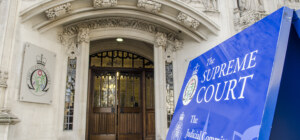New automatic disqualification provisions for charity trustees and senior management – what you need to know

Nicola Evans Charities Counsel
With effect from 1 August 2018, new provisions added to the Charities Act 2011 came into force extending the previous rules for automatic disqualification as a trustee of a charity. In particular, new circumstances for automatic disqualification have been added and, importantly, automatic disqualification has been extended to people acting in a senior management role. Even if your charity is not affected directly now, there are steps which all charities should take to adjust to the new rules.
What is changing?
Previously, the Charities Act 2011 provisions triggered automatic disqualification of charity trustees on conviction for certain offences relating to dishonesty or deception (unless the conviction was spent), where the individual was an undischarged bankrupt (and related circumstances), where they had been removed as a charity trustee by the Charity Commission (the Commission) or by the Court on grounds of misconduct or mismanagement in the charity, removed under Scottish charity legislation, or otherwise disqualified as a company director (unless given specific leave to act).
From 1 August 2018, the automatic disqualification provisions have been extended, in essence, by:
- applying for the first time to those holding office or employment in the charity with ‘senior management functions’ (ie automatic disqualification is no longer limited to charity trustees);
- widening the categories of convictions for which someone will be disqualified; and
- adding further circumstances in which someone will be disqualified.
In more detail:
- ‘Senior management functions’ – this phrase is only partially defined in the new provisions. The legislation appears to have in mind the positions of Chief Executive Officer and Chief Finance Officer (or equivalent) and that is how the Commission has interpreted it.
- Additional offences – the offences triggering automatic disqualification have been expanded to include certain offences relating to: terrorism, money laundering and bribery, misconduct in public office, perjury or perverting the course of justice, contravention of certain Commission orders in a statutory inquiry and attempting, conspiring, inciting, aiding and abetting, counselling or procuring, encouraging or assisting such offences.
- Additional circumstances – the rules around the circumstances in which an individual can be automatically disqualified have been widened to include: removal as an officer, agent or employee of a charity (ie not only removal as a charity trustee as previously) for misconduct/mismanagement (or involvement therein), being found in contempt of court for false disclosure or false statements, becoming a designated person under terrorism asset-freezing legislation or being on the sex offenders register.
Are these the only relevant provisions for disqualification?
It should also be remembered that, in addition to the rules on automatic disqualification, the Commission has a discretionary power to disqualify a trustee (which would also disqualify the person from holding office or employment with senior management functions). Individuals may also be barred from being a charity trustee or holding certain positions within a charity under the disclosure and barring rules on who is eligible to work or volunteer with certain vulnerable groups.
What guidance is available?
The Commission has produced:
These documents give comprehensive guidance on the new provisions and what they mean for charities and individuals.
The Commission’s website also has links to sample declarations (within their Guidance for charities) which the Commission recommends charities ask their charity trustees and senior management to sign (these declarations are similar to those produced by HMRC under the fit and proper persons requirements).
What should charities, charity trustees and those in senior management positions do?
Even if trustees think that the new disqualification provisions do not affect their charity, they should review their processes for recruiting new trustees and those with senior management functions to check that they take account of the new rules. Prudent steps to take may include:
- within the recruitment process, asking potential trustees and candidates for senior management roles whether they are disqualified;
- checking the individual’s details against the list of disqualified persons published by the Commission and the list of disqualified company directors published at Companies House; and
- asking potential trustees and senior managers to sign a declaration (such as the Commission’s sample declaration) prior to or on appointment, confirming that they are not disqualified.
Charity trustees or senior staff who are disqualified by virtue of the new provisions (who had not applied for a waiver (see below) before the provisions came into force) must stand down immediately, as it is a criminal offence to act while disqualified. If the charity trustees were to allow the person to remain in office knowing they are disqualified, it would likely be a serious incident which should be reported to the Commission.
Charities should also review their employment contracts for senior management to see if they need amending, to address a situation where a senior member of staff becomes disqualified. Charities should also review their constitution, to check what it provides regarding disqualification, especially if they may want to apply for a waiver at some point (see below).
The Commission also recommends that charities ask their trustees and those with senior management functions to sign their sample declarations periodically to confirm they have not become disqualified since being appointed.
Waivers
Individuals disqualified under the rules can still apply to the Commission for a waiver. If applying for a waiver, charities should check their constitution as it may not permit someone who is disqualified, or subject to a disqualification provision (such as bankruptcy), to hold office, in which case a Commission waiver cannot override it.
The Commission has produced guidance on its waiver decision-making process and appeals, available here. It aims to deal with an application for a waiver within 30 days.
Most charities will not be affected by these new provisions directly at present, but taking a few governance steps now should ensure that charities are not caught out by the provisions in the future.










